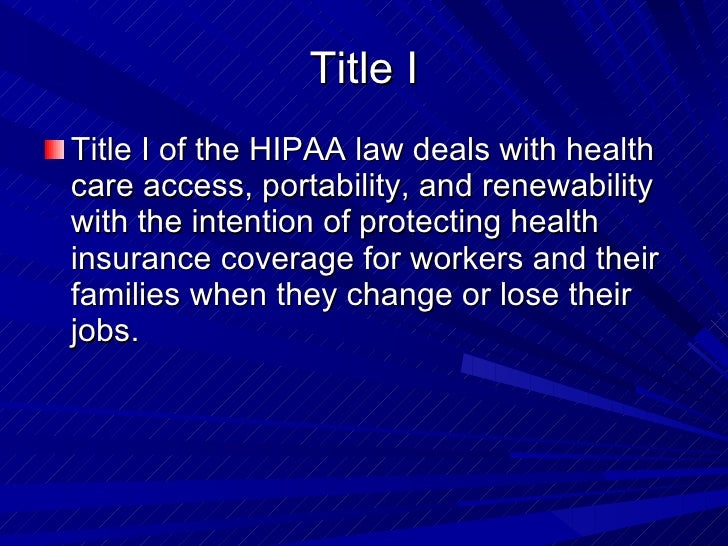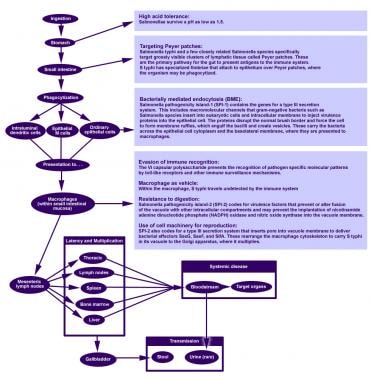HIPAA Health Insurance Reform. Department of Health and Human Services HHS to develop regulations protecting the privacy and security of certain health information.
 Sylvia Hipaa Powerpoint Presentation 2010 1
Sylvia Hipaa Powerpoint Presentation 2010 1
The Health Insurance Portability and Accountability Act of 1996 HIPAA required the Secretary of the US.

Hipaa title 1. The Health Insurance Portability and Accountability Act HIPAA of 1996 was passed to protect an employees health insurance coverage when they lose or change jobs. HIPAA is a legislative act made up of these five titles. Title I Health care access portability and renewability requires employers and health plans to allow a new employees medical insurance coverage to remain continuous without regard to pre-existing conditions.
Title 2 is designed to prevent health care abuse and fraud by defining offenses and setting penalties for them. But its worth noting that Title I only covers employer-provided plans. HIPAA is divided into two main titles.
Discover some common HIPAA violations examples and scenarios. Visit the CMS website below for Title I information regarding pre-existing conditions and portability of health insurance coverage. HIPAA Title I of the Health Insurance Portability and Accountability Act of 1996 protects health insurance coverage for workers and their families when they change or lose their.
Title I of the Health Insurance Portability and Accountability Act of 1996 HIPAA protects health insurance coverage for workers and their families when they change or lose their jobs. Title II lists health care system rules and penalties but is most well known for its Administrative Simplification rules. Title I covers something that is quite familiar today insurance reform.
The Basics HIPAA Title I makes it easier for you to change jobs without losing your health coverage and limits your new health plans ability to deny coverage based on a medical condition you had before getting the new coverage a preexisting condition. A IN GENERALSubtitle B of title I of the Employee Retire-ment Income Security Act of 1974 is amended. THROUGH THE EMPLOYEE RETIREMENT INCOME SECURITY ACT OF 1974.
Title I amended the Employee Retirement Income Security Act ERISA the Public Health Service Act PHSA and the Internal Revenue Code of 1986 IRC to improve the portability and continuity of health insurance coverage in the group and individual markets. HIPAA-covered entities include health plans clearinghouses and certain health care providers as follows. HIPAA is Organized into Separate Titles Title I.
Title I works with group and individual health insurance plans to ensure availability to you. The Health Insurance Portability and Accountability Act HIPAA provides privacy protections for protected health information PHI. In 1996 Congress passed the Health Insurance Portability and Accountability Act HIPAA made up of five titles.
Title I fills a need left unmet by the Employee Retirement Income Security Act of 1974 ERISA. What is HIPAA Title I. HIPAA Health Insurance Reform.
Insurance Reform to provide continuous insurance coverage for workers and their insured dependents when they change or lose jobs An independent organization that receives insurance claims for the physicians office performs edits and transmits claims to insurance carriers is known as aan. Plans that are paid for by the individual fall under the Affordable Care Act. Those who must comply with HIPAA are often called HIPAA-covered entities.
Title 1 as defined by the Centers for Medicare Medicaid Services protects health insurance for workers and their families if they change or lose jobs. The Health Insurance Portability and Accountability Act HIPAA was created primarily to modernize the flow of healthcare information stipulate how Personally Identifiable Information maintained by the healthcare and healthcare insurance industries should be protected from fraud and theft and to address limitations on healthcare insurance coverage such as portability and the coverage of individuals with. It also has provisions to ensure the privacy and confidentiality of Protected Health Information PHI.
The Health Care Authority HCA follows HIPAA rules for Apple Health Medicaid and Public Employees Benefits Board PEBB programs and must provide privacy protections for personal and health information collected about members. Frequently Asked Questions for Professionals - Please see the HIPAA FAQs for additional guidance on health information privacy topics. HIPAA enacted by the United States Congress in 1996 has two functions.
HIPAA Title I. TITLE IHEALTH CARE ACCESS PORTABILITY AND RENEWABILITY Subtitle AGroup Market Rules PART 1PORTABILITY ACCESS AND RENEWABILITYREQUIREMENTS SEC. HIPAA or the Health Insurance Portability and Accountability Act of 1996 covers both individuals and organizations.
What is the primary purpose of HIPAA Title 1. 1 To fulfill this requirement HHS published what are commonly known as the HIPAA Privacy Rule and the HIPAA Security Rule.
